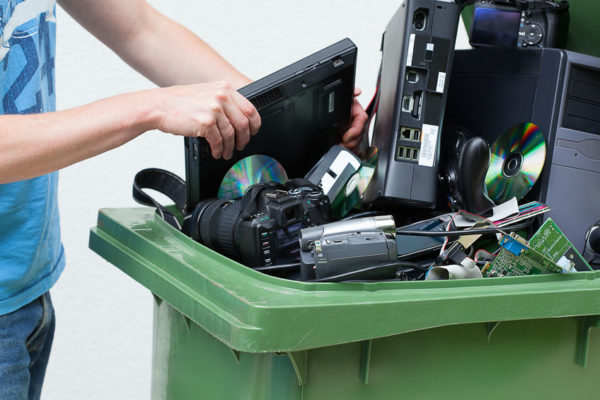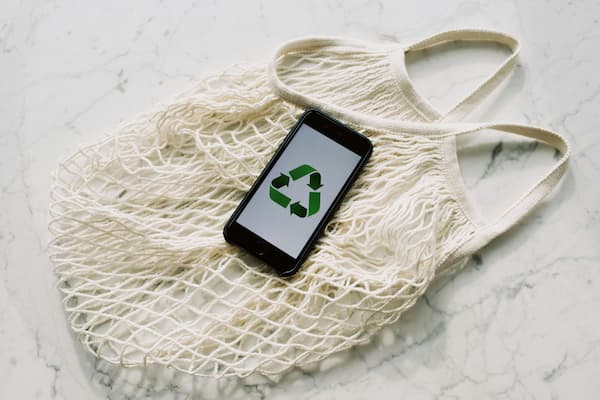It’s no secret that our world is drowning in trash. What might be surprising, though, is the environmental double whammy posed by some of our beloved gadgets. Electronic waste, or e-waste, encompasses any defunct electronic device or appliance, harboring significant environmental risks and untapped potential. Not only do these gadgets contain precious minerals crucial for their functioning, but they also harbor toxic chemicals that traditional landfills cannot safely manage. While 25 states in the US have outlawed the disposal of e-waste in regular garbage, the issue extends far beyond state boundaries. That’s why we’ve developed a nationwide hardware recycling initiative, offering guidance on the proper disposal of e-waste, regardless of your location.

Electronic devices contain various hazardous materials such as lead, mercury, cadmium, and brominated flame retardants. When improperly disposed of, these substances can leach into the soil and water, polluting the environment and posing serious health risks to humans and wildlife. Recycling hardware not only prevents these toxins from entering the ecosystem but also conserves valuable resources by recovering materials like gold, silver, copper, and aluminum for reuse.
Environmental Impact of Improper Disposal:
Electronic devices, from smartphones to computers, contain a complex mix of materials, including hazardous substances like lead, mercury, cadmium, and brominated flame retardants. These toxic elements serve various functions within the devices but pose significant risks when they end up in landfills or are incinerated.
Soil and Water Contamination: Improper disposal of electronic devices can result in the release of these hazardous materials into the environment. When electronic waste is dumped in landfills, rainwater can leach through the waste, carrying toxic chemicals into the soil. Over time, these pollutants can seep into groundwater, contaminating drinking water sources and harming ecosystems. Similarly, when e-waste is incinerated, toxins can be released into the air, contributing to air pollution and potentially contaminating soil and water with airborne pollutants.
Health Risks: The presence of hazardous materials in electronic waste poses serious health risks to humans and wildlife. Lead, for example, can cause neurological damage, especially in children, while mercury exposure can lead to kidney and nervous system disorders. Cadmium is known to cause kidney damage and respiratory issues, while brominated flame retardants have been linked to hormone disruption and developmental disorders. When these substances enter the food chain through contaminated soil or water, they can bioaccumulate in animals and eventually reach humans, posing a threat to public health.
Benefits of Responsible Recycling:
Recycling hardware offers a sustainable solution to mitigate these environmental and health risks while also unlocking various benefits:
Prevention of Pollution: By diverting electronic waste from landfills and incinerators, recycling helps prevent the release of hazardous materials into the environment. Proper recycling processes ensure that toxic substances are safely extracted and disposed of, minimizing the risk of soil, water, and air pollution.
Resource Conservation: Electronic devices contain valuable resources such as gold, silver, copper, and aluminum, which can be recovered through recycling. By extracting and reusing these materials, recycling conserves natural resources and reduces the need for environmentally destructive mining operations. For example, recycling one million laptops can save the energy equivalent of electricity used by 3,657 U.S. homes in a year.
Energy Savings: Recycling electronics consumes less energy than mining and processing raw materials. For instance, recycling aluminum requires 95% less energy than producing it from raw materials, while recycling copper saves up to 85% of the energy required for extraction. By conserving energy, recycling helps reduce greenhouse gas emissions and mitigates climate change.
Job Creation and Economic Opportunities: The recycling industry creates jobs in collection, processing, and refurbishment, contributing to local economies and fostering sustainable development. By promoting recycling initiatives, communities can stimulate economic growth while protecting the environment and public health.
In conclusion, responsible recycling of electronic hardware is essential for safeguarding the environment, public health, and natural resources. By choosing to recycle our electronics, we can minimize pollution, conserve valuable materials, and pave the way towards a more sustainable future for generations to come.
Research Local Recycling Options: Start by researching local recycling options in your area. Many communities offer electronic waste recycling programs or have designated drop-off locations for old electronics. Check with your municipal waste management authority or visit their website for information on recycling centers and collection events.
Manufacturer Recycling Programs: Several electronics manufacturers have initiated recycling programs to take back their products at the end of their lifecycle. Companies like Apple, Dell, HP, and Samsung offer convenient options for recycling their branded devices. Visit their websites or contact customer support to learn more about their recycling initiatives.
Certified E-Waste Recyclers: Choose certified e-waste recyclers who adhere to environmental and data security standards. Look for certifications such as R2 (Responsible Recycling) or e-Stewards to ensure that your hardware is recycled responsibly and ethically.
Data Sanitization: Before recycling your hardware, ensure that all sensitive data is securely erased to protect your privacy. Use data wiping software or seek assistance from a professional IT service provider to sanitize your devices thoroughly.
Battery Disposal: Batteries, including lithium-ion batteries commonly found in smartphones and laptops, require special handling due to their chemical composition. Many recycling facilities accept batteries separately to prevent fires and environmental contamination. Dispose of batteries responsibly by following local regulations or returning them to retailers participating in battery recycling programs.
Before you recycle your electronic devices, safeguard your privacy by thoroughly wiping any personal data, explore donating operational electronics to charitable causes, engage in local e-waste collection drives, and inspire others to join the movement for responsible hardware recycling and e-waste management.

As technology evolves and time marches on, even our most cherished electronics eventually reach the end of their lifespan. When your gaming console no longer offers an extra hour of entertainment or your cell phone fails to receive a single text, it’s time to bid them farewell responsibly. Thankfully, numerous options exist for properly disposing of these retired devices. Consult our Hardware Recycling Guide below for a list with organized e-waste reclamation programs. Alternatively, consider visiting one of the many retailers offering e-waste recycling services in your area. Whether it’s a TV-tube computer monitor or any other outdated gadget, let’s ensure they find a fitting resting place as we pave the way for a greener, more sustainable future.
Founded in a San Francisco, California basement in 1997, VirtualPBX delivers Business Phone, Contact Center, AirDial POTS Replacement, VirtualText, and The Work Browser to our customers, who work in the office, remotely, and everywhere in between. We offer more than just products and services; we make your business better with quality customer care and 24/7 support.
1998-2025. VirtualPBX.com, Inc. All rights reserved. VirtualPBX, TrueACD, and ProSIP are ® trademarks of VirtualPBX.com, Inc.